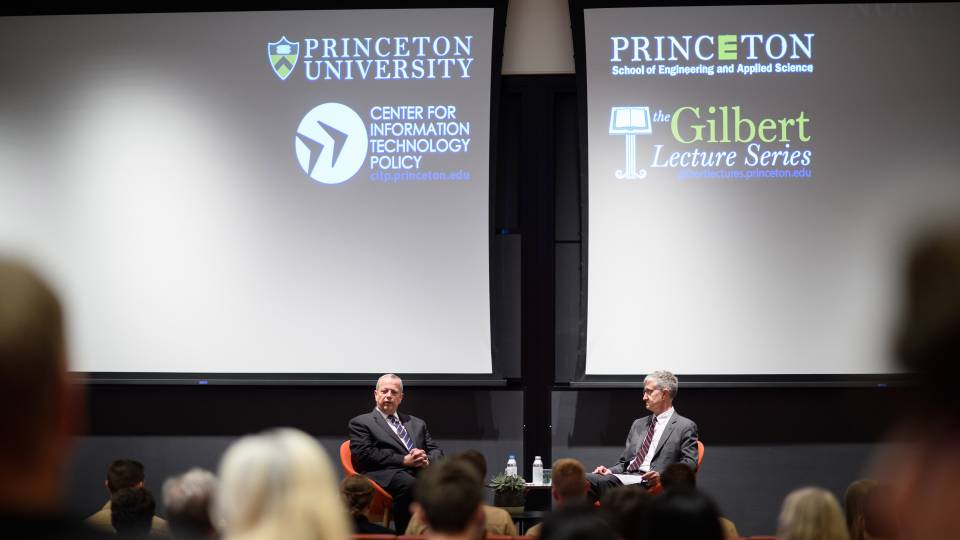Robert George, McCormick Professor of Jurisprudence and director of the James Madison Program in American Ideals and Institutions, has been noted in the press for his role as an adviser to the Bush administration on moral issues. While George declined to discuss any specific advice for the president, he sat down with a member of the University's communications staff to discuss the moral considerations that should bear on the United States' use of military force.
Where can President Bush turn for moral guidance as he considers launching a military response to the terrorists that attacked our nation on Sept. 11?
A set of criteria has evolved for assessing the justifiability of the use of force by governments; it is known as the "just-war theory." In the past when presidents have ordered troops into battle, they ordinarily have justified their decisions by appealing to this tradition. President Bush's father invoked it very explicitly in defending his decision to send troops to evict Iraq from Kuwait.
The tradition has settled on the idea that a just war can only be fought in self-defense or in defense of others. It rejects the idea that war may legitimately be conducted for the sake of revenge. The basis for a just war is the redress and prevention of aggression.
The tradition also insists that nonviolent means are to be preferred where they will suffice. Leaders of nations can be justified-and even morally obligated-to use force, but only as a last resort.
Do you think this situation meets the definition of a justifiable war?
We have, alas, witnessed episode after episode of deadly aggression by terrorists who have made it abundantly clear that they will not be deterred by anything short of force. I therefore have no doubt that our nation and her allies are fully justified in using force against them as well as against persons, organizations, and governments that abet their crimes.
Are there additional criteria of just war?
Yes. The just-war tradition rejects the idea that lives can legitimately be lost or taken in causes that are futile. For the use of force to be justified, there must be a reasonable possibility of success.
In a war against loose networks of international terrorists, this is a significant challenge. The administration has to establish that the means it proposes to employ will likely be effective in preventing terrorism that would otherwise likely occur.
How has the administration dealt with that issue so far?
I think the pressure being put on the administration to say what counts as victory is entirely legitimate. Secretary of Defense Donald Rumsfeld is a person for whom I have great respect, but when he was initially confronted with that question, the answer he gave was too abstract to be satisfactory. He said that victory would be achieved when Americans and others could feel free to go about their business without fear of terrorist attacks. We need a more concrete set of objectives. The administration will have to define more clearly and precisely what counts as success.
President Bush has said that he wishes to rid the world of evil. Is this possible?
Well, no president, no military, can do that. But action can be taken to eliminate, or at least blunt the force of, particular evils, whether they are natural evils like landslides and polio or moral evils like Nazism, communism, and terrorism. In attempting to express the depth of his commitment to fight the evil of terrorism, President Bush overstated the breadth of what can be accomplished.
Still, let me take this occasion to add that there are evils in addition to terrorism (and not unrelated to it) that can and should be addressed, including the evils of poverty and oppression. Of course, we cannot simply impose modern free market economies, the rule of law, democracy, and respect for human rights in Afghanistan and elsewhere in the region; but we should use our resources in the political and diplomatic arenas to encourage movement in the right direction. We should also be generous in providing humanitarian support to people who have already suffered much and will certainly suffer more in the days ahead.
Some people are fearful that a war we wage against Osama bin Laden will result in the deaths of many Afghan citizens, who really have nothing to do with his terrorist plots.
This is a very important concern. According to just-war theory, people who are not contributing to the threat of aggression-noncombatants-may not be deliberately attacked. They may not be attacked for revenge. They may not be attacked-and this is critical to understand, the tradition is very clear on this-even for deterrence. It would be gravely wrong for us to terror bomb Afghan or other non-combatants in tit-for-tat fashion as a means of deterring terrorists-even if we had good reason to believe that such attacks would be effective in achieving that goal.
At the same time, the principle of noncombatant immunity does not mean that a nation in conducting an otherwise justified war can never perform military operations whose foreseeable consequences include the deaths of noncombatants. In striking legitimate military targets, the likely or even certain deaths and injuries of noncombatants can (subject to certain conditions which I'll describe in a moment) be accepted as side effects or "collateral damage."
We can, perhaps, see this most clearly by thinking about circumstances in which our own civilians might be killed as a matter of collateral damage caused by our nation's military actions. President Bush told us the other day that after he learned of the attacks on the World Trade Center he decided to order the shooting down of any hijacked airliner that was believed to be heading for a building where thousands of people would be killed. I think that this was a morally justified decision. And it would have been justified even if there were some chance that the passengers could wrest control of the plane from the hijackers before it could be used as a missile. Their deaths, though foreseen and accepted, were not the object of the president's choice. They were unavoidable side effects of an action whose object was preventing the plane from being used as a missile to kill a lot of other people.
It is important to see that in evaluating the morality of choices of this kind, the national, ethnic, racial, religious, and even the political identities of noncombatants are of no relevance. The just-war tradition affirms the principle of equal human dignity. The Golden Rule forbids our treating people we don't know or who have no connection with us or differ with us in ways that are irrelevant to their status as noncombatants as having less of a right to life than people who happen to be our fellow citizens.
We can't say, "Look, it's too bad that in attacking these terrorist bases, 3,000 people are going to be killed, but they're only Iraqis." Even in cases of collateral damage, a proposal for a possible military strike can fail the moral test of treating people fairly. The question to ask is: Would we be willing to accept the collateral damage if some of our own citizens, perhaps including our friends and loved ones, were among the victims? Where the answer is "yes," as it was for President Bush in considering whether to shoot down hijacked airliners, the choice, though tragic, can pass muster from the moral point of view.
A closely connected principle of just warfare is often referred to as the requirement of proportionality. This principle forbids using more force-especially deadly force-than is necessary to deter aggression. The use of force, particularly where harm to noncombatants is likely or inevitable, must be proportionate to the evil it is being employed to avert.
Will President Bush feel pressure from the American public to bomb Afghanistan?
Well, I hope and trust that this president will not engage in militarily useless bombing, especially where harm to noncombatants will result, merely to create the appearance of taking action. That would be a very wicked thing to do. Similarly, I think that justice requires the rejection of high altitude aerial bombing which ensures that there will be no casualties among our own airmen, but does so at a price of grossly disproportionate numbers of civilian deaths and injuries. Of course, one of the dangers of being president in wartime is that one may be faced with the temptation to violate just war principles to maintain one's standing in the polls. I pray that President Bush will resist such temptation.
The president is a man of faith and knows that he is ultimately answerable to God. For a serious believer, losing public support and failing of re-election is one thing; losing your soul is something else.
Contact: Marilyn Marks (609) 258-3601

